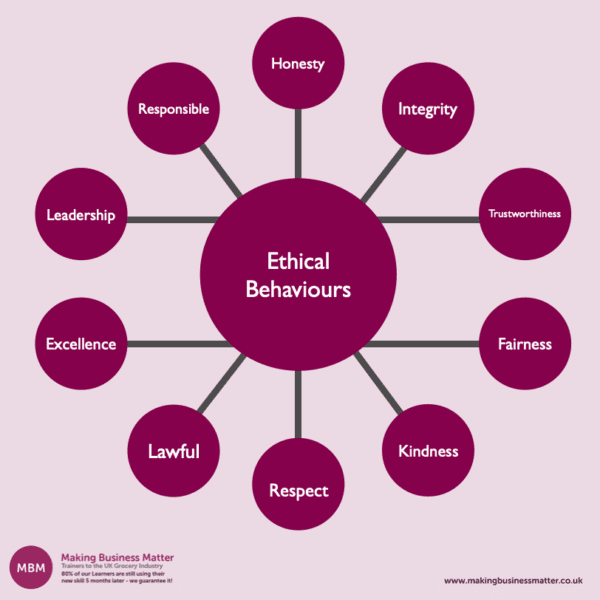Ethics in Management: Different Approaches, Types and Benefits
Exploring Ethics in Management
Ethics in management refers to a company’s social responsiveness. It is ‘the discipline that deals with what is good and evil, or right and wrong, or moral responsibility and duty.’
In other words, ethics in management can be defined as a set of moral principles. Principles that govern the actions of a person or a group. It is a norm of behaviour that guides leaders and managers in their day-to-day actions. Company core values shape business ethics. And the establishment of an ethical culture relies on leadership. It is particularly true of leaders who display integrity, unity, and respect.
Let’s take an example here:
The late Bill Gore, founder at W.L. Gore Associates, spent all his time visiting small groups of workers. He explained his organisational philosophy to them.
The corporation had four guiding ethical standards in place of rules:
1. Strive to be fair with all associates, vendors, and clients.
2. Assist and urge all stakeholders to develop their abilities, skills, and responsibility.
3. Make and keep commitments.
4. Consult others in the decision-making process.
A study on the management of ethics conducted by Barry Posner & Warren Schmidt highlights the following:
- A managers’ primary goal is to make their organisation effective. Boosting profits and the interests of stakeholders were not their core priorities.
- Attending clients was seen as necessary.
- The quality most highly valued by managers at all levels was integrity.
- The pressure to stick to organisational expectations is seen to be high.
- In helping their mates cope with ethical dilemmas, spouses are essential.
- In ethical confusion, most managers seek the counsel of others.
10 Ethical Behaviours

Here are 10 behaviours that outline ethics in management:
1. Honesty
In all their dealings, ethical executives are honest and truthful. They do not purposely mislead or deceive others by partial truths, selective omissions, or any other means.
2. Integrity
Ethical executives show personal honesty and courage. They are principled, trustworthy and upright. They fight for what is correct. Lastly, they will not betray morality or be duplicates.
3. Trustworthiness
Ethical executives are worthy of faith. They make every fair effort to fulfil the letter and spirit of their promises and commitments.
4. Fairness
Ethical people show a commitment to fairness. They treat people equally with tolerance and acceptance of diversity.
5. Kindness
Ethical executives are loving, compassionate, generous and kind. They help those in need and aim to meet their business goals with the least damage.
6. Respect
They treat all people, regardless of sex, race or national origin, with equal respect and dignity.
7. Lawful
Ethical managers follow rules and regulations in their company operations.
8. Excellence
In conducting their duties, ethical employees seek excellence. They are well educated and trained. They actively aspire to improve their competence in all areas.
9. Leadership
Ethical employees strive to be positive role models as leaders. They help to build an atmosphere in which they are highly respected for principled thinking.
10. Responsible
They consider and accept responsibility for their choices and actions.
Approaches To Ethics In Management
Basically, there are 3 approaches to ethics in management. Each of them is discussed in the points below:
1. Consequence Based Approach
Managers check their decisions through this approach. Here, the emphasis is on the action and not the reason behind the action. It measures positive and negative outcomes. If positive effects outweigh the negatives, company decisions are justified.
In this approach, managers analyse the potential options before taking a specific action.
For example, a manager might receive more revenue from fees or company donations from bringing on a certain event in a city. It can be an adventure programme such as boxing, but it will have a harmful effect on a number of residents.
They might fear noise pollution or harm from competitors or loss of property during the programme.
Here, the manager would look at this event from a cost-benefit viewpoint. He will conclude that most people in the group would appreciate this activity. And that the company would make more money from providing the programme. The manager will also ignore the neighbours concerned about potential damage and noise.
It will bring more money to the organisation. But the disappointed residents could sue for property damage. Moreover, it might lead to an expensive case for the organisation.
2. Moral Rights Approach
In this strategy, managers adopt a moral code that takes care of natural and moral rights. It includes the right to speech, life, and protection, and to express emotions, etc.
Managers reveal all the necessary details in the annual reports. When disclosing information, its time and validity are taken into account.

For example, a manager may see that it is difficult for some of the workers to engage in official training. It might be because they lack the necessary skills. Or, they might have a different challenge in participation. Some might even have a financial crisis.
Managers with the moral rights approach should determine specific responsibilities. They should help group members who are facing issues. They should check whether specific duties are required.
One clear advantage of this approach is supporting the disadvantaged person. The manager can make some reasonable settings for the same. The downside is that it may put the disadvantaged in the limelight. It will make them feel unjust.
3. Social Justice Approach
Managers who take the social justice approach look for equality and fairness. No one is discriminated against based on caste, religion, race, or gender. But differences are justified based on skills or performance.
For example, workers belonging to any gender, with the same abilities are equal. But treating employees who produce better than those who make less is justified.
This approach has two principal theories — the liberty principle and the difference principle.
The Liberty Principle
Every person has some fundamental freedom. Those should be consistent with other people’s equal freedoms.
The Difference Principle
It stands for resolving social and economic bias. It supports the equal distribution of goods and services.
Types of Workplace Ethics
Archie B. Carroll has identified three types of management ethics or standards of conduct. They are as follows:
1. Immoral Management
It suggests a lack of ethical standards that managers adopt. Even if it is harmful to the ethical requirements or employee concerns, managers want to maximise profits.
2. Moral Management
In this, managers strive to increase profits, considering ethics. They adhere to standards of conduct that are ethical and legal. The core principle here is, ‘Is this action fair to us and all parties involved?’
3. Amoral Management
It falls between moral and unethical management ethics. Managers only react to personal and legal ethics if they are expected to do so. Otherwise, there is a lack of ethical interpretation.
Two types of amoral management are applicable:
Intentional
According to Bob Dunn, President and CEO of Business for Social Responsibility:
‘Ethical decisions aren’t as easy as they used to be. Now, they’re the difference between right and right.’
It is fairly easy to choose between right and wrong by depending on principles. But business often demands that we select from alternatives that are neither wholly right nor wholly wrong.
In organisations today, most managers ignore ethics on purpose. They believe that corporate ethics is meaningless. It is because instruction in business ethics ignores real-life challenges. According to them, ethics should be practised only for non-profit motives.
Unintentional
Here, managers do not avoid ethics on purpose. But, they casually make choices when moral consequences are not taken into account.
Benefits of Ethics in Management
There are a number of clear benefits to managing ethically. These include:
1. It’s a Part of Our Developing Society
Without ethics, kids would still work in factories. 16-hour workdays would remain to be the norm. And sexism, harassment, and unfair labour practices would still be part of doing business.
But, change is taking place in our society. New societal and working standards are now being developed. For all of us, this is wonderful.
2. It Helps Maintain Morale During Tough Times
The code of ethics gives you a tool to make clear choices. It shows what is right and wrong. When making decisions in times of crisis, this is incredibly helpful.
There is often no robust moral framework during periods of turmoil to direct leaders and managers. Continuing commitment to workplace ethics constantly stimulates them as to how they want to behave.
3. It Supports Employee Growth
A firm evaluated several managers and executives on a series of tests. It had one most significant finding. The more mentally healthy employees, the more they score high on ethics assessments. Bennett explained that in his article Unethical Conduct, Stress Appear Linked.

Ethics allows workers in the company to face the facts, both good and bad. They feel like by operating an ethical operation, they contribute to society in a meaningful way. This sense of obligation brings meaning and context to what they do daily.
4. It Improves Productivity
When you enforce ethics regularly, your organisation will develop goals and collaboration. Employees who feel aligned with the company’s ethics, respond with utmost dedication.
5. It Promotes Goodwill
Ethics help in cultivating a positive image for your company. The informed public of today is doing more research and watching more closely. The customers check how corporations treat them, and if they really ‘walk the talk.’
The aim should be to apply ethical principles to daily business decisions constantly. Consequently, it is the basis for a profitable company with excellent corporate social responsibility.
How to Handle Workplace Ethics?
Below, are five examples of how to better handle workplace ethics:
1. Accept It as an Ongoing Process
Understand that ethics in management is an ongoing process, rather than a practice. Ethical systems create codes, rules, and procedures, minutes of meetings, newsletters, etc. Yet, the most significant element in ethics management is reflective dialogue. It initiates a process of strategic planning.

2. Try to Eliminate Its Occurrence
The best way to deal with ethical dilemmas is to stop their occurrence in the first place. That is why activities such as the establishment of ethics codes and codes of conduct are so important. It introduces employees to ethical considerations and minimises the chances of unethical activities.
3. Have the Right Mechanism
Proper mechanisms should be in place to deal with the complicated ethical issues in the day-to-day business realities. Also, have a grievance policy for employees to use to settle conflicts with managers and employees.
4. Have Adequate Training
It isn’t enough to have codes and regulations in place that address ethics. In circumstances involving ethics, workers need to be taught how to act.
Many employers, therefore, enrol their workers in an ethics training programme. It fosters ethical conduct and improves the ethics code/policies of an organisation. Thus, it is important to make sure the training of employees about the ethics management programme.
5. Enforce Policies and Procedures
Have policies and procedures (and keep updating them) to reward ethical behaviour. Also, enforce unethical conduct penalties.
Conclusion
Ethics in management is the responsibility of every manager. For several reasons, upholding ethical standards is important. You will build a healthier atmosphere.
Thus, do something positive by taking steps to encourage ethical management in your workplace. It will boost your brand image, and make you feel good. Above all, it helps you to make sensible decisions.
